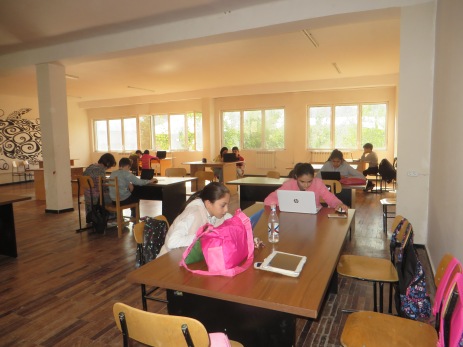Perhaps creativeness is one of the most important factors in the process of education, and it is important that it become stimulus at all the stages of education. But is it possible to provide the learners with a creative atmosphere and environment without giving them enough freedom? It is nearly impossible to do in a traditionally necessitated classroom with some desks collected in one place, no matter they are placed П-shaped or behind each other.With these arrangements of desks, the teacher, in any case, is in the centre with his/her significant instructions. A free creative atmosphere doesn’t fit this kind of table arrangements. To solve this problem I considered it necessary to have a 108 square meter classroom to organize my lessons. It is easy to implement project-based teaching in a spacious area when different groups can be seated apart from each other in different corners of the classroom. There is less noise and the groups do not disturb one another.
To give the learners a chance to think and express themselves freely, compose, create, have round-table discussions, make recordings and videos, stage small performances in a free and creative environment: these are the problems that I am trying to solve during my classes. Are they a success? I want them to be a success. In any case, I am making my efforts in that direction.
I usually suggest that the learners should choose poems for the work they have decided to do: recordings, making videos or learning by heart. It is good when the learners are engaged in the search for good literary pieces in the big world of literature. How much do they read to choose, what do they choose, how do they choose?
There are poems which I myself set apart to be studied in groups, and in this case, too, learning them by heart doesn’t become special work: the learners learn them by heart while being engaged in other activities. For example, if they are assigned to introduce a poem, they themselves should choose the way of doing it. It may be a game, performance, dance or a song. They discuss that choice so lively. As a rule, I do not interfere with their discussion. So the group performances are interesting to me too. Here is one of their presentations.
While carrying out their project the learners often need some other educational environment: a reading-room, garden, corridor… I take it for granted. I trust the learners. Hasn’t the traditional classic model of a lesson exhausted itself? If teaching is project-based if there is a free choice of students’ activities, why should we be restricted in a closed area, in a classroom with a preliminary defined teacher and schedule? What is it explained with? What is it justified with? I encountered that issue a year or two ago. The learners took up carrying out individual and group projects, lesson hours became project-based and new problems arose. For example, a group needs another environment to shoot a video film, needs a noiseless place to do some recordings, is making a radio material for which the current environment isn’t convenient. Other learners turn to me with their problems. This is a working environment with its busy noise. Other conditions and environment are needed for the group making a radio material. The teacher is one and the working groups are many. Getting out of the closed area, choosing another environment, doing creative work independently, away from the teacher’s controlling eyes, is magnetic, inspiring and attractive for the learners. On the other hand, how should I act so that the learners get involved in educational activities, and not waste the hour allocated for the lesson? How can we get that self-discipline? How can we give freedom to the learners ensuring their educational activities?
Performance in the garden
There was another problem. The power of habit is great. I had to convince myself that educational life could go on without me as well, and I wasn't the cornerstone of the educational process, and that the learners could gain even more from each other and from the environment and from the project activities than from the classroom activities organized by the teacher. It was not so difficult for me to overcome that power of habit: the years’ experience of individualized teaching helped me. And the problem of the learners' effective work, when they are out of the teacher's control, was solved with the following arrangement with the learners: at the end of the day I am to see their report of what they have done in the form of a recording, video film, radio material, interview or of something else. That report may be a small completed part of the project which can be seen. It is up to the learners to decide which presentation form to choose. Sometimes the learners shot the process of their work and published it on their blogs. That was also an interesting way of a report. Otherwise, a group, an individual student was deprived of the right to do project work out of the classroom. They don’t usually want to lose the opportunity of being engaged in free activities. Here is a small extract of a video film telling about such independent work. Pay attention to the learners’ spontaneous freedom which, perhaps, wouldn't occur in the presence of the teacher.
Who says that learners do not respect agreements? They do respect, especially, when these agreements touch their interests. For the last two-three years, a group has rarely failed to publish their material in time. Anyway, they published it with some delay.
So at the end of the working day, I can see the result of the students' work. I can't say anything about the process of their work. I don't think that the details are important. After their project work the learners come back to the classroom happily and inspired, and in the evening, already at home, I can see the result of their creative work. And I am fully satisfied with it. I am pleased and so are the students. The activities we carry out are educational, creative, interesting and, of course, effective.


